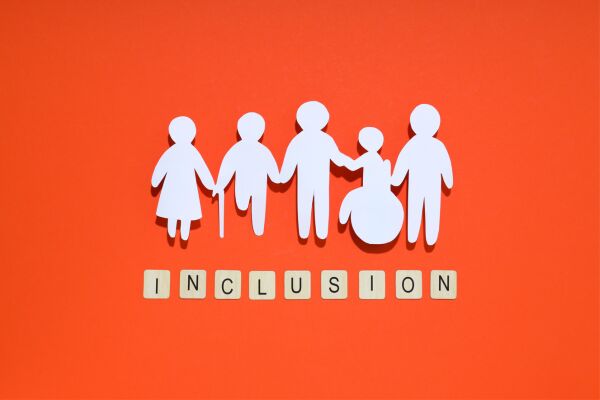Equity, Diversity and Inclusion in Research: Environments and Team Cultures
Introduction
With diversity comes the responsibility of providing a safe, supportive and respectful workplace and research environments in which team members at every career stage feel safe to participate and have equitable opportunities for professional development. The purpose of this guide is to share practical resources for creating positive, inclusive, and equitable research environments and team cultures.
Key considerations
- Inclusion
- Accommodations and Accessibility
- Equitable mentorship, training, and access to professional development opportunities

Inclusion
Inclusion means that all team members are valued, respected and have equitable access to opportunities. In an inclusive environment, everyone can contribute to research excellence in an environment free from barriers and biases.
Inclusive Behaviours Guide
Newcastle University
As part of its EDI Toolkit for Researchers, this guide on Inclusive Behaviours describes the importance of role models and how to role model inclusive behaviours. Key action items:
- Understand issues such as imposter syndrome or unconscious bias, that can hold your team back
- Listen and learn from the experiences of a diverse range of people
- Be an ally (see next section)
- Recognize your own privilege
- Take responsibility for your own learning
- Understand the value of diversity
- Be open to feedback
- Be mindful of the language you use
- Take action and be visible in your support
- Don’t make assumptions about people
Guide on Equity, Diversity and Inclusion Terminology
Government of Canada
The Government of Canada’s guide on key terms and concepts related to equity, diversity, accessibility and inclusion includes definitions, notes, usage examples and cross-references to terms as applicable. Key action items:
- Familiarize yourself with these key terms and concepts
Disarming Racial Microaggressions: Microintervention Strategies for Targets, White Allies, and Bystanders
Sue, D. W., Alsaidi, S., Awad, M. N., Glaeser, E., Calle, C. Z., & Mendez, N. (2019). Disarming Racial Microaggressions: Microintervention Strategies for Targets, White Allies, and Bystanders. American Psychologist, 74(1), 128–142.
This article introduces a strategic framework for addressing microaggressions offering concrete action steps and dialogues that targets, allies, and bystanders can implement. Key action items:
- Make the “invisible” visible – name the microaggression
- Disarm the microaggression by stopping or deflecting the comments or actions through expressing disagreement, challenging what was said or done, and/or pointing out its harmful impact
- Educate the Perpetrator – the goal is to reach and educate the perpetrator by engaging them in a dialogue
- Seek external reinforcement or support from others or from institutional authorities
This Guideline sets out the expectations of the University regarding the standard of civil conduct that it expects and requires all employees to maintain in dealings with each other. The document includes:
- Examples of civil and uncivil conduct
- Guidance about where to go with a concern/complaint about workplace conduct
- Guidance about the responsibilities of parties involved in a complaint
- Other relevant procedures and related policies
Ten Simple Rules for Building an Anti-Racist Lab
Bala Chaudhary, V., & Berhe, A. A. (2020). Ten simple rules for building an antiracist lab. PLoS computational biology, 16(10), e1008210-e1008210
This open access paper presents ten rules to help labs develop antiracist policies and actions in an effort to promote racial and ethnic diversity, equity, and inclusion in science and academic workplaces. Key action items:
- Lead informed discussions about antiracism in your lab regularly
- Address racism in your lab and field safety guidelines
- Publish papers and write grants with BIPOC colleagues
- Evaluate your lab’s mentoring practices
- Amplify voices of BIPOC scientists in your field
- Support BIPOC in their efforts to organize
- Intentionally recruit BIPOC students and staff
- Adopt a dynamic research agenda
- Advocate for racially diverse leadership in science
- Hold the powerful accountable and don’t expect gratitude
Growing a Healthy Lab
Weir, K. (2022). Growing a healthy lab. Monitor on Psychology, 53(5)
This article describes why lab cultures matter and offers suggestions for Principal Investigators on creating healthy lab environments. Key action items:
- Set the standard – good workplaces don’t happen by accident. Be intentional about what kind of environment you want to create and lead by example
- Wear multiple hats – being an effective PI means being both a mentor and a manager
- Nurture relationships and discourage competition
- Create a safe environment free of harms such as harassment, bullying, and sexual misconduct and a safe space where people feel supported in speaking up
- Embrace diversity and inclusion – diverse perspectives foster innovation and creativity
Creating an Inclusive Research Lab with Student Onboarding Materials
Hernandez, I. A., Smith, J. L., Villodas, M. T., & Thoman, D. B. (2023). Creating an inclusive research lab with student onboarding materials. 2(4), 197-198
This article describes the utility of onboarding materials for creating positive environments. It describes the benefits to new research lab students and the team. Key action items:
- Offer onboarding materials that consist of a wide range of information, including lab guidelines, expectations, training materials and other essential resources
- Provide incoming students with an orientation to the lab, their role in it and what is expected of them. This facilitates connections to the research lab and expedites socialization into STEM
- Promote the type of lab culture that you, as the faculty research supervisor wish to cultivate
Equity, Diversity, and Inclusion in Research Teams and Training: Promising Practices and Resources Handbook
University of Toronto, Office of the Vice-President, Research & Innovation (May 2024)
Users must log in with UTORid credentials
The handbook provides a range of practices for advancing EDI in research on an ongoing basis. The ‘Inclusion’ section provides practical examples to build a supportive, respectful, and welcoming research and training environment that fosters a sense of belonging for all team members. Key action items:
- Integrate inclusive practices into the day-to-day management of the team
- Apply an equity lens to the organization of research team events
- Foster a leadership style that is intentionally inclusive
- Address any issues that arise swiftly and in a sensitive manner, respecting privacy and confidentiality
- Share EDI and wellness resources with team members

Accessibility and Accommodations
Some team members may need modifications to their work environment, schedule or duties to perform effectively. Members may need accommodation due to a disability, religious beliefs and/or caregiving/family responsibilities.
Accessibility Guide
Newcastle University
This guide explains why accessibility is important and what can be done to create accessible content and spaces. Key action items:
- Accessible physical spaces – think about how a variety of users can access campus, laboratory, and fieldwork locations, individual buildings and the rooms/spaces within these buildings. (e.g., ramps, elevators, push buttons to open doors)
- Accessible content – think about the language and message, the structure, and the format of all written content such as documents or websites (e.g., imagery, use of colour, headings and structure)
Supervision Guidelines for Faculty – Section 7: When a Student May Need Accommodations
University of Toronto, School of Graduate Studies
University of Toronto guidelines for supervisors on student accommodations. This page describes Accommodations vs. Time-Limited Academic Adjustments and resources available to help support students with disabilities. Key action items:
- Students should be encouraged to approach their supervisor with accommodations needs
- Ultimately, the goal of providing accommodations is to make sure that students are provided with the tools to be successful regardless of their disability
- Be open to students who choose to discuss with you their disability or the functional limitations that are a result of their disability
Best Practices for Supervisors & Instructors of Graduate Students with Family Responsibilities
University of Toronto, School of Graduate Studies
A description of best practices for supervisors and instructors of students with family responsibilities and includes a list of University of Toronto specific resources. The best practices address a few examples of family responsibilities including:
- Pregnancy or expecting a child
- Breastfeeding in the classroom
- Sick child
- Elder care or other caregiving
Demystifying Academic Accommodations
University of Toronto
This document provides instructors with practical information and resources about accommodating students with disabilities at the University of Toronto. Key action items:
- Students, staff and instructors all have responsibilities in the accommodations process and in creating an accessible environment
- A student’s specific diagnosis is private medical information under Human Rights Code guidelines and therefore students shouldn’t be asked to disclose
- Types of accommodations can apply to classrooms, labs and course work, tests/exams, placements, research and outside the classroom
Ten Steps to Equity: Making Fieldwork Accessible
Alexis-Martin, B. (2023). Ten Steps to Equity: Making Fieldwork Accessible. Times Higher Education
This article describes ten strategies to ensure disabled students and academics are included by field-based disciplines. Key action items:
- Normalise fieldwork with a disability
- Represent disability in fieldwork – Inclusion begins with representation
- Fund disability-inclusive fieldwork training
- Don’t make assumptions
- Bake inclusivity into field trips
- Be responsive and enabling
- Virtual fieldwork is real fieldwork and can be offered as a viable alternative to on-site fieldwork
- Respect hidden disabilities
- Embrace failure and learn from it – plan to have debriefing meetings where staff and students can reflect on what can be done better next time
- Nothing about us without us – no one is better qualified to talk about disability than people who are disabled; however, this does not mean that the burden of organising accessible fieldwork should be placed on the shoulders of disabled colleagues alone
Inclusivity for All: How to Make Your Research Group Accessible
Levine, A. G. (2020). Inclusivity for all: How to make your research group accessible. Science
This article describes ways of working towards providing an accessible space for science research. Key action items:
- Ask what student/team members need to do their best work
- Team culture is important – provide a nurturing environment
- Respect that needs are fluid and change – offer a flexible workplace culture

Allyship
Allyship, actively supporting and advocating for colleagues from marginalized or minoritized groups, helps create a more inclusive environment.
Allyship and Inclusion
University of Toronto, Temerty Faculty of Medicine
This resource describes the qualities of allies and how we can act as allies to one another. Key action items:
- Be self-reflective, empathetic, willing to keep learning
- Support others – stand up for others and speak up
- Be aware of and vigilant of your own prejudices
- Avoid making assumptions and question stereotypes
- Challenge practices, policies and procedures that may create barriers for specific individuals and groups
A Guide to Allyship
Association of American Medical Colleges
This toolkit, from the Association of American Medical Colleges, provides foundational information on what allyship is, how to act as an ally and barriers to becoming an ally. It focuses on allyship in relation to gender equity, but many of the ideas described are applicable to allyship with other group identities. Key action items:
- A – always center on the impacted
- L – listen and learn from the oppressed
- L – leverage your privilege
- Y – yield the floor
Allyship Guide
Newcastle University
This Newcastle University guide describes what it means to be an ally and gives examples of how to be an ally to others. Key action items:
- Recognize the privileges you have
- Learn strategies to become an active bystander such as addressing challenging behaviours and language
- Stay focused on the people you are supporting and the impact you want to have
Guide to Being an Ally to Transgender and Nonbinary Youth
Sexual Orientation and Gender Identity Nursing: The Trevor Project’s Toolkit
Geared to health sciences and nursing education and research, this guide is an introductory educational resource that covers a wide range of topics and best practices on how to support transgender and nonbinary people. Key action items:
- Refrain from sharing anyone else’s story for them
- Do not ask unprompted questions about a transgender or nonbinary person’s body, medical history, plans for medical procedures, their previous name, or invasive details
- What to do If you’ve offended someone – listen, be accountable, commit to do better
Attention Men: How to Be an Ally
Association for Women in Science
A description of the role of men as allies and why they are important in STEM. Key action items:
- Allyship is a continuous process that involves constantly learning and questioning
- Begin establishing new norms by intervening in conversations that seek to put down women
- Encourage other men to listen to women by expressing your validation of women’s concerns
- Be ready to remove yourself from the conversation and open a space to listen and have others speak

Hidden Curriculum
The hidden curriculum refers to unspoken rules, expectations, and social norms that are not explicitly stated but are considered essential for success. Awareness of the hidden curriculum in research environments and their implications for all team members is necessary for creating an inclusive, equitable environment.
Disrupt and Demystify the Unwritten Rules of Graduate School
Richardson, C., Serrano, A., Gorski, G., Price, A. N., & Zimmer, M. (2021). Disrupt and demystify the unwritten rules of graduate school. Nature Geoscience, 14(8), 538-539
This article describes the existence of hidden academic norms and expectations that can be exclusionary and hostile for individuals with marginalized and intersecting identities. Key action items:
- Train graduate students in research development (will help them stay focused as they hone their specific research directions)
- Provide formal opportunities to discuss and create community guidelines on work–life balance practices with faculty and peers
- Encourage students to access training and support for their mental health
- Teach students how to establish mentoring relationships and professional networks
Practical Strategies to Mentor around Hidden Curriculum Pathways in Engineering
Villanueva Alarcon, I. (2022). Practical Strategies to Mentor around Hidden Curriculum Pathways in Engineering. 2022 IEEE Frontiers in Education Conference (FIE), 2022-, 1–7
Users must log in with UTORid credentials for full-text article
This paper provides practical tips on how individuals navigate hidden curriculum in engineering. Key action items:
- Review the strategies mentors can use to help mentees become aware of the hidden curriculum (e.g., creating multiple opportunities for feedback, clarifying expectations and intentions)
- Consider complementing existing resources (e.g., student manuals, onboarding) to be tailored to the discipline or departmental culture of the mentee
- Invite mentees to provide feedback on existing onboarding documents and to comment what additional items can be included
- Pay close attention to what value systems you adhere to in your discipline and research. (e.g. does the profession value individualism, competition, and meritocracy? How do these values translate to who your student mentees consider is the ‘ideal student’?)

EDI Training
Resources for team members on creating inclusive, equitable and safe environments.
Unconscious Bias Education Modules
Toronto Initiative for Diversity & Excellence (TIDE)
TIDE’s education module series introduces the concept of unconscious bias, how it manifests in processes and procedures and how academic units can adopt more inclusive practices.
The modules have been designed for everyone seeking education about unconscious bias and how it can affect assessments, decisions, and inclusive climates. They may be used as a self-guided education tool, a resource for committees to review prior to assessment activities or to facilitate discussions within groups.
EDI Education Calendar
University of Toronto, The Division of People Strategy, Equity & Culture (PSEC)
A calendar with the wide range of EDI trainings/workshops available to the University of Toronto community across the tri-campus offered by the Anti-Racism and Cultural Diversity Office, the Sexual and Gender Diversity Office and the Accessibility for Ontarians with Disabilities Act (AODA) Office and the Office of Indigenous Initiatives.

